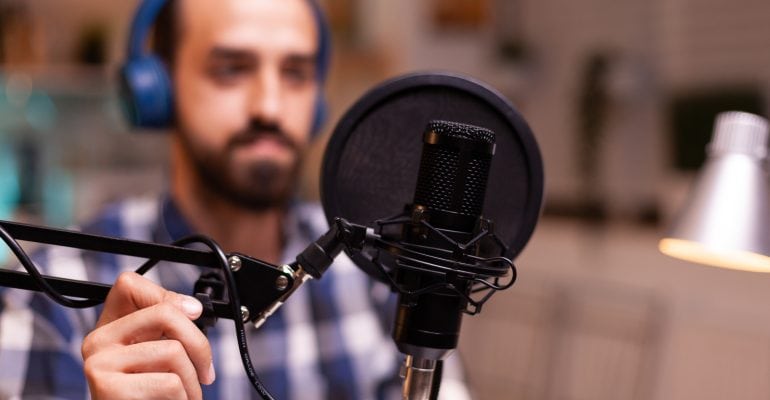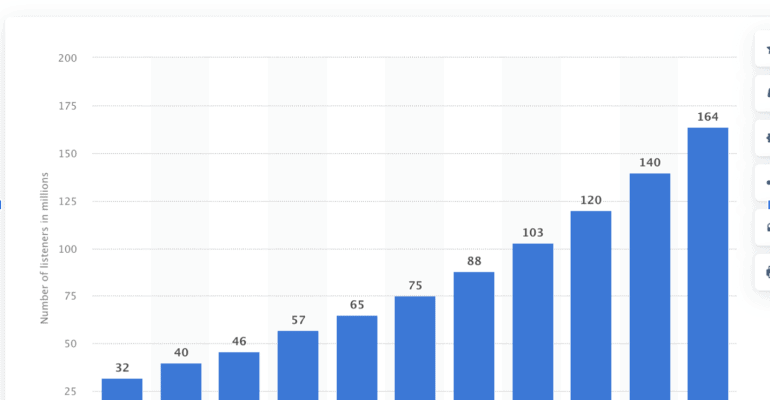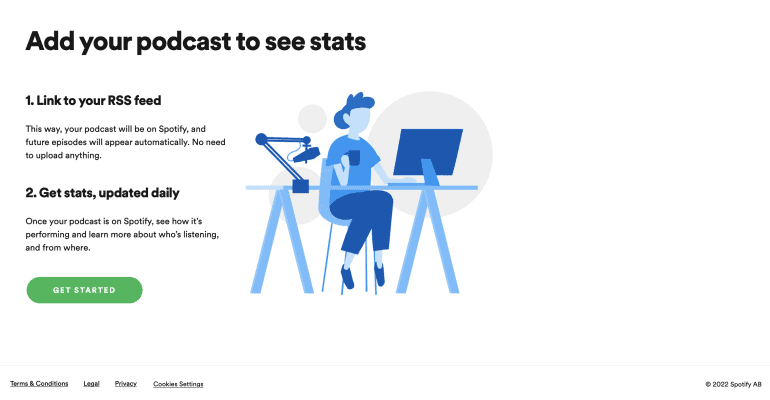Podcasts are a powerful way to engage with listeners and reach new audiences.
Whether you’re building on an existing project or starting from scratch, creating a new podcast is a big step.
The longer format enables creators to explore topics in greater depth while building relationships with their audience.
With that in mind, it’s no surprise that the podcasting industry has seen so much growth over the past decade.
The number of American monthly podcast listeners more than doubled from 75 million in 2018 to a projected 164 million in 2024, and that trend will likely continue throughout the 2020s.
This has also led to an increase in demand for podcast voice actors .
Source: Statista
Apple, Google, and Spotify are the kings of the podcasting industry in 2024.
Getting your podcast published on these platforms is the best way to maximize outreach for a new podcast.
In this article, we’ll explain how to get your podcast live on these three channels.
How to Submit Your Podcast to Apple There are two different ways to publish a podcast on Apple Podcasts.
The first option is to submit the podcast as an RSS feed hosted by another provider.
Alternatively, you can become a part of Apple’s in-house Podcasters Program and sell subscriptions through Apple Podcasts directly.
To connect an RSS feed to Apple Podcasts, sign into Apple Podcasts Connect and click “Add.”
From there, confirm that you want to add an RSS feed, then enter the URL associated with your podcast.
Finally, simply select the settings you want to use to publish the podcast.
For example, you can make your podcast publicly available, or limit access to a specific group of users.
You can also add custom messages, adjust regional availability, set release dates, and more.
Publish Through Apple Podcasters Even if your show doesn’t have an RSS feed, you can still publish it on Apple Podcasts through the Apple Podcasters Program.
One benefit of Apple Podcasters is that you can offer subscriber-only benefits exclusive to Apple Podcasts.
The first step is the same — navigate to Apple Podcasts Connect and select “Add.”
Since you’re creating a new show instead of importing an existing one, you’ll need to enter a little more information.
Apple will ask for the podcast’s name, artist, description, channel, type, update frequency, category, language, website, and copyright details.
You can also mark your show as containing explicit content.
Whichever option you choose, your podcast will be reviewed and technically validated before it becomes available to users.
The technical validation should be quick, but Apple may take more time to review the content and make sure it meets their guidelines.
This video offers a detailed visual guide for creators who need help submitting a podcast to Apple:
How to Submit Your Podcast to Google Google has long been the most popular search engine, so it’s no surprise that it’s also a lucrative podcasting platform.
Podcasts published on Google are automatically distributed through each of the following platforms:
Google searches with in-browser playback
The Google Podcasts website
The Google Search app for Android
The Google Podcasts app for Android and iOS
Smart speakers and displays with Google Assistant
Google Assistant Content Action
Apple CarPlay and Android Auto
Google Discover
Naturally, this makes Google a top target for podcast creators.
You can make your podcast available on Google by either managing your own RSS files or relying on a podcast hosting service.
As with Apple Podcasts, connecting a podcast to Google depends on how your files are hosted.
Unlike Apple Podcasts, Google indexes podcasts automatically, so you won’t have to go through the kind of process described above.
If your podcast is hosted by a third-party, it may already be available on Google through automatic indexing.
The same is true if you manage the RSS files directly, but this option requires more legwork on .
There are two main conditions for getting a podcast on Google:
You must have already published at least one episode.
The RSS feed and audio files must be accessible online without a password.
Podcasts won’t be indexed if they’re protected by a password or other security measure.
If your show meets these two conditions, follow these instructions to ensure that Google recognizes the podcast and makes it available to listeners:
Follow your host’s instructions to publish the podcast.
Go to Google Podcasts Manager and verify ownership.
Publish your podcast through PubSubHubbub .
Use the Google Search Console to request a crawl of your homepage.
How to Submit Your Podcast to Spotify Finally, Spotify is the third main platform where almost every podcast creator will want to publish their show.
Like Apple, Spotify is a closed platform, so it won’t pull your podcast automatically like we saw with Google.
On the other hand, Spotify is like Google in that it doesn’t actually host podcasts — the only way to publish is to link to an external RSS feed.
Fortunately, this is extremely simple if you already work with a major podcast aggregator.
The Spotify website provides a directory with more information about connecting to 25 unique podcast services.
Even if you have your own RSS feed, it should only take a couple of minutes to connect it to Spotify.
First, go to Spotify for Podcasters and log into your account (or create one).
Once you log in, Spotify will ask for the link to the RSS feed.
You will need to verify your email address to confirm that you’re the owner of the podcast.
This is also where you’ll add in the category, language, location, and other details.
Once you click “submit,” you should be able to access your podcast on Spotify through the provided URL.
According to their guide , it can take a few hours for newly uploaded podcasts to appear in the Spotify app.
Final Thoughts If you want to connect with a podcast audience, you need to publish on the most popular channels.
In 2024, the top three players are Apple, Google, and Spotify.
Without availability on at least these three services, you’ll have trouble getting the word out and generating interest with new listeners.
Fortunately, making your podcast available on Apple, Google, and Spotify is a quick and easy process.
While each platform has its own unique procedures, all three of them make it relatively simple to get a podcast listed.
These tips will help you publish as quickly as possible and focus on the creative side of your new podcast.
To make your podcast as successful as possible, you need to work with voice actors who can give your show a unique sonic identity.
Check out our team of experienced podcast voice actors to find a voice actor who fits your project.








0 Comments